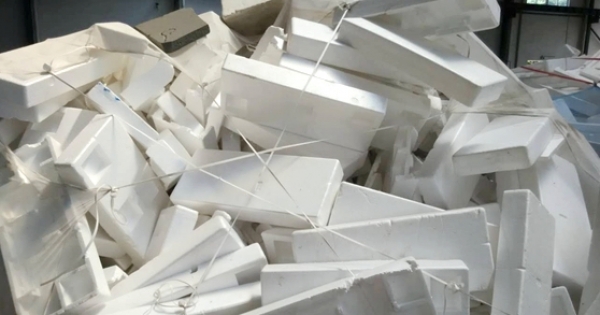
Its real name is expanded polystyrene, but in Chile we know it better as plumavit. It is one of the most cross-cutting plastic products: it is highly hygienic, does not rot, does not generate mold or decompose. These features make you a favorite when choosing materials that protect from shocks, serve as heat or cold insulators, or are used as single-use containers.
But despite its properties, the environmental damage it generates persists: in Chile about 360 million tons are discarded per year, where an estimated 60 million are the product of industrial work and the other 300 for personal and domestic use. Without proper reuse or recycling treatment, plumavit can stay up to a thousand years on the planet because it is not biodegradable.
And while the culture of recycling commits more people and organizations every day, the specific case of plumavit is complex. “What is difficult in its logistics is that it is a very light material, difficult to compact and move. Its recycling is also complex: large-scale machinery is needed and there is no need for a sufficient scale solution in Chile today to deliver a guarantee that it will be recycled in our country,” says Veronica de la Cerda, general manager of Triciclos Chile.
Solutions for dry snow
The question remains: if its reuse – at least for the time being – is so complex, what do we do with the plumavit? Veronica de la Cerda estimates that you can’t always recycle everything. “It’s a huge challenge and a nice opportunity to change. There are products on the market that are recyclable easy, perfect. But there are others that need to be eliminated: there is necessary innovation in some products, and there are others – as in the case of plumavit – that should be migrated to other types of materials.”
Efforts are already in place in the world to eliminate its use. On July 1, a law was fully enforced in New York that prohibits the use of this material primarily for the food industry, although several lawmakers have been looking to fully veto expanded polystyrene. Mayor Bill de Blasio himself commented that it is not possible to recycle the plumavit “in an economically viable or environmentally effective manner.”
Similar steps that Costa Rica already thought long ago. Last Monday the Costa Rican President, Carlos Alvarado, signed a law passed by Congress that prohibits the import, marketing and delivery of containers of plumavit, although in the case of the country of Central America the document will only come into force two years from now.
"El reclamo puede ser genuino, pero construido sobre una mentira", apuntó el presidente Javier Milei…
El gobernador de la provincia de Buenos Aires, Axel Kicillof, encabezó un acto en Ensenada…
El diputado nacional de La Libertad Avanza, José Luis Espert, expresó su confianza en la…
Tras la masiva reaparición de Cristina Fernández de Kirchner, el presidente Javier Milei apuntó contra…
El principal propósito de la nueva comisión es evaluar los recursos humanos en el Senado,…
En una medida que busca redefinir las condiciones de los seguros de automóviles en Argentina,…
Esta web usa cookies.